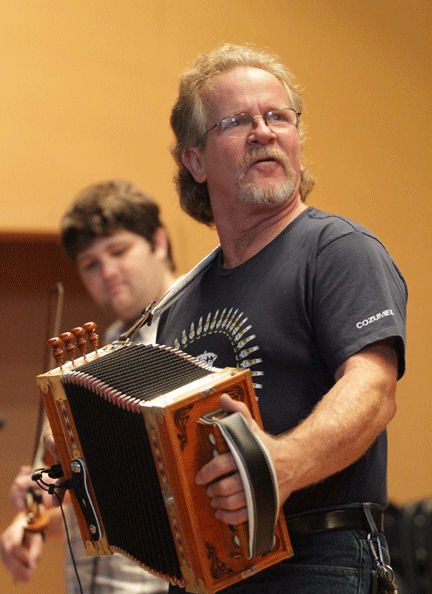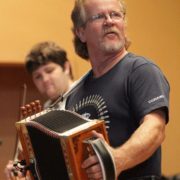Bayou Music, Country and Cajun Country Revival
Jesse Lége (Cajun Music Hall of Famer) Tells The Story
 It may seem hard to believe there was a time, not so long ago, when a small local town depended more on the live music of a weekly dance hall show than computers, radios or television for their entertainment. Somewhere in the earth and wind of Southwest Louisiana, legendary accordionist and Cajun Music Hall of Famer, Jesse Lége, must have absorbed the dance hall music of his times the way others drink water. It was his main form of entertainment for many years in the same way that iTunes now provides exposure to new music for so many young people. If he had been born around the turn of the 20th century his story wouldn’t be that unusual. Musicians around that time came to be legendary and enigmatically great directly through first-hand contact with other musicians and pure exposure to the traditions of song from their regions. Lége, born well after the turn of the century in 1951, grew up much like the country and Cajun music legends he later came to admire. His family didn’t have electricity until he was 14. He heard his native Cajun music from his brother’s transistor radio or from trips to enjoy the modern conveniences at his grandfather’s house-who did have electricity.
It may seem hard to believe there was a time, not so long ago, when a small local town depended more on the live music of a weekly dance hall show than computers, radios or television for their entertainment. Somewhere in the earth and wind of Southwest Louisiana, legendary accordionist and Cajun Music Hall of Famer, Jesse Lége, must have absorbed the dance hall music of his times the way others drink water. It was his main form of entertainment for many years in the same way that iTunes now provides exposure to new music for so many young people. If he had been born around the turn of the 20th century his story wouldn’t be that unusual. Musicians around that time came to be legendary and enigmatically great directly through first-hand contact with other musicians and pure exposure to the traditions of song from their regions. Lége, born well after the turn of the century in 1951, grew up much like the country and Cajun music legends he later came to admire. His family didn’t have electricity until he was 14. He heard his native Cajun music from his brother’s transistor radio or from trips to enjoy the modern conveniences at his grandfather’s house-who did have electricity.
But, for Jesse Lége the music came to life in the local dance halls where he heard Cajun and old-time country music for the first time. For him, there was a natural flow between the two musical forms. The styles were the soundtrack he grew up with and came to love. So, when he picked up his first guitar and accordion, it was natural to gravitate toward the music of Cajun accordion great, Amédé Adorin and the earthy country of Hank Williams. With his musical partner, fiddle player, Joel Savoy, he has created a legacy, on record and through live performances, of great pure Cajun music that never ceases to capture the imagination and give way to the urge to dance.
In recent years playing together with Portland’s Caleb Klauder Country Band helped the two artists reconnect with traditional country music. The result is Joel Savoy & Jesse Lege and The Cajun Country Revival (CCR) playing this Sunday, June 24th at the Long Beach Bayou Festival. With the 2011 release of their first The Right Combination, CCR has produced one of the best roots album of the last five years fiercely and boldly infusing their passion and skill with progressive imagination and a real love for the tradition they have grown from. Their live performances have proved to be no less of an experience in roots music at its best.
In the conversation that follows the flow of the music and its stories take shape in the life of Jesse Lége who embodies the roots of a very special form of America’s musical traditions.
TR: Tell me about your understanding of the beginning of Cajun music and how it connected with traditional country.
JL: Cajun came into in the 20s and 30s. Once the string bands from Texas started coming into Louisiana the two came together. Guitars could easily play alongside fiddles and accordions. Texas Swing was already beginning to happen in the 30s. So, when classic country came to the Cajuns, the songs would be transcribed into French for that sound.
TR: Who were the influences picked up on from the country music?
JL: Hank Williams, Ray Price and Bob Wills. The Cajuns heard the songs and many of them would get picked up and made into Cajun songs. When Joel Savoy and me got started playing with this band out of Portland, Caleb Klauder Country Band, we were doing the same thing they were doing back then. We jammed and it seemed putting country together with Cajun music was natural. We called it The Cajun Country Revival (CCR).
TR: Were you intentionally trying to recreate that sound?
JL: Not completely. They invited us to a gig in Portland and it just felt natural to pick up on those old country songs with our instruments and style. So, we rediscovered it in the same way they did back then. During our set we mix it up. We play some pure country and some pure Cajun and then combine the two.
TR: Do you try to bring in other forms of music?
JL: I know very little about rock and roll or jazz. I like all music and have favorite songs in all genres, but for playing, I’m not into playing it. I’ve always been traditionally Cajun, but the old time country music seems to go together well with it. The guys in the country band also have an old time music trio called Foghorn. They play old time music in a really bad ass way. Once we played with them on the east coast. Joel and me were going on after them. Joel’s not intimidated by other musicians at all. But, after they went on he looked at me and said..”what are we gonna do? How are we gonna follow that?” They tore the place down.
TR: Let’s talk about the songwriting. Probably the most famous of mainstream songs in country music with Cajun influence is Hank William’s Jambalaya. What about the authorship of the song?
JL: There are some stories about it. It’s like the song Grand Texas was the tune and some say Jambalaya was picked up by Hank Williams. But, who is to say? Hank was in Louisiana a lot when he was on the Louisiana Hayride. So, it may have been his own. But, no one knows for sure.
TR: Songs do get around, sold to other writers and swapped.
JL: Oh my goodness! I stay in touch with the old guys and they talk about songs they wrote that were stolen. In the dance hall days, if you were to play a new song and it wasn’t recorded, some other musicians would take it away. Later, the writer would hear their song on a record or the radio written by someone else! So, if you had a new song, you learned to record it before you played it live.
TR: Doesn’t songwriting tradition work this way?
JL: Yeah. Sometimes they’d take a song and change two or three words or chords and make it a different song. Some music would be re-named from an original tune, they’d put their own title on it. A lot of songs from the 20s and 30s were done this way. For example, Amédé Ardoin was the master on accordion. He was not that easy to copy. So, someone would take a song like Two-Step and break it into two songs to make it easier then give it a different title.
TR: Who would you say represents the founder of Cajun in the same way that Bill Monroe represents the origins of bluegrass?
JL: That would be Amédé Ardoin. He was the first in the recorded history of the music. Also Dennis McGee played with him on Cajun fiddle. There were a lot of talented Cajun players but Amédé would be the main one.
TR: You had a unique childhood.
JL: I lived in the country. I went to a country school for six years. That’s when I first started learning English. I went to high school in town, which was only 8 miles away, but we hardly ever went there before that.
TR: So, you grew up without electricity? How did you hear music?
JL: I had one older brother who brought a transistor radio to our house. That’s how we heard music. My grandfather lived up the road and had electricity. We would go to his house to hear a lot of music. The main place for live music near our house, though, were the dance halls. We lived near one of the most popular ones in the country.
TR: How were you introduced to playing music live?
JL: My dad had a distant cousin who’d visit us on weekends. He played guitar, fiddle and accordion. He put his guitar down once when he was visiting and I picked it up and started playing some rhythm on it. He liked the way I kept beat so he taught me some chords. I played the G and C chords all night. We had an old guitar, so I learned to play guitar and harmonica. When my dad’s cousin would come on the weekend, I started picking up the accordion. I found it was a lot like the harmonica only you didn’t have to blow into it. When my cousin heard me playing it he said, “You need an accordion. I’m going to make you a deal. I’ll give you this old accordion and if you learn to play, you buy a new one and give me this one back.” I learned and bought a new one for 62 bucks. A year later we were playing house dances, with my younger brother, who picked up the guitar and my first cousin who played fiddle.
TR: How old were you when you first started playing?
JL: I used to say I was 16, but I remember it was when we first moved into our new house with electricity. I think I was around 14 or 15.
TR: What happened to that first accordion loaned to you by your cousin?
JL: I still have it. It was a Hohner. His daughter came to a festival few years back and told me she had a couple of old accordions he left behind. One was that old Hohner. It still played!
TR: You’ve talked a lot about the dance halls. What has happened to them?
JL: They’ve mostly all disappeared. Now, we may play cafes, local bars or pizza places. I like the cafes and pubs because they bring back the old atmosphere of the dance halls and house dances. I like to play festivals to big crowds, but I still love to sit back in a corner of a pub with a three piece band and just play.
Here is where you can find out more about Jesse Lége
Terry Roland is an English teacher, freelance writer, occasional poet, songwriter and folk and country enthusiast. The music has been in his blood since being raised in Texas. He came to California where he was taught to say ‘dude’ at an early age.
Bayou Music, Country and Cajun Country Revival
Jesse Lége (Cajun Music Hall of Famer) Tells The Story













